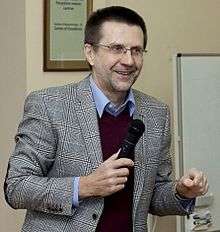Virginijus Šikšnys
| Virginijus Šikšnys | |
|---|---|
 | |
| Born | January 26, 1956 |
| Nationality | Lithuania |
| Fields | Biochemistry |
| Institutions | Vilnius University Institute of Biotechnology |
| Alma mater | Vilnius University |
| Known for | |
| Notable awards |
|
Virginijus Šikšnys (born January 26, 1956) is a Lithuanian biochemist.
Biography
V. Šikšnys studied organic chemistry at Vilnius University, receiving his Masters in 1978, then moved to Lomonosov Moscow State University, where he studied enzyme kinetics and received Candidate of Sciences degree (equivalent to PhD) in 1983.[1] From 1982 till 1993 he worked at the Institute of Applied Enzymology in Vilnius. In 1993 he was a visiting scientist in prof. Robert Huber’s laboratory at the Max-Planck-Institut für Biochemie, Martinsried, Germany. Since 1995 V. Šikšnys is the chief scientist and head of the Department of Protein-DNA Interactions at the Vilnius University Institute of Biotechnology, since 2006 – professor at Vilnius University and a member of the Lithuanian Academy of Sciences, since 2007 – chair of the Institute of Biotechnology Council.[2][3]
Research
The research interests of V. Šikšnys include structure-function relationships of enzymes involved in nucleic acids metabolism. V. Šikšnys and members of his laboratory perform biochemical, biophysical and structural studies of proteins involved in bacterial antiviral defense, including restriction endonucleases and CRISPR-Cas systems. V. Šikšnys has co-authored more than 90 scientific publications and filled 5 patent applications. For more than two decades Šikšnys’ lab was focused on restriction endonucleases. Together with colleagues from UK, Poland, Germany and other countries, Šikšnys has performed biochemical studies of more than 20 restriction endonucleases, and solved approximately one third (~15 out of ~50) of currently available restriction endonuclease tertiary structures, some of them in collaboration with the Nobel Prize laureate prof. Robert Huber. Since 2007 V. Šikšnys focused on mechanistic studies of CRISPR-Cas, the newly discovered bacterial antiviral systems, and was among the first to demonstrate programmable DNA cleavage by the Cas9 protein.[4][5][6] The genome editing technology based on Cas9 was licensed to DuPont.[7][8]
Honours and awards
- 2001 Lithuanian state Science award (with dr. Saulius Klimašauskas)
- 2004–2005 Lithuania state scholarship
- 2012 Vilnius University Rector's award
- 2015 St. Christopher award for the merits in science from the Vilnius City Council
- 2016 Warren Alpert Foundation Prize
- 2016 EMBO associate membership
References
- ↑ His thesis is: Шикшнис, Виргиниюс. Термостабильность ферментов, ковалентно иммобилизованных в полимерных гелях: Спец. № 02.00.15—хим. кинетика и катализ.—М.:[МГУ], 1983—23 с.,граф.
- ↑ "Šikšnys Virginijus". Lietuva, T. IV (Biografijos R-Ž, Papildymai A-Ž) [Lithuania, vol. IV (Biographies R-Z)] (in Lithuanian). Vilnius: Mokslo ir enciklopedijų leidybos centras. 2015. p. 483. ISBN 978-5-420-01758-6.
- ↑ "Šikšnys Virginijus". "Asmenybės. 1990–2015 m. "Lietuvos pasiekimai": apžvalgų ir biografijų rinkinys, T. II [Personalitties. 1990–2015."Lithuania achievements": reviews and biographies set, vol. II] (in Lithuanian). Vilnius: Leidybos idėjų centras. 2015. p. 1036. ISBN 9786099557847.
- ↑ Sarah Zhang (2015-10-04). "The Battle Over Genome Editing Gets Science All Wrong". wired.com. Retrieved 2015-01-19.
- ↑ Lander ES: The Heroes of CRISPR. Cell 2015, 164:18–28. doi:10.1016/j.cell.2015.12.041
- ↑ Gasiunas G, Barrangou R, Horvath P, Siksnys V: Cas9-crRNA ribonucleoprotein complex mediates specific DNA cleavage for adaptive immunity in bacteria. Proc Natl Acad Sci U S A 2012, 109:E2579–2586. doi: 10.1073/pnas.1208507109
- ↑ "DuPont Pioneer Gains Exclusive License for Genome-Editing Technology from Vilnius University". 2015-06-23. Retrieved 2015-01-19.
- ↑ Grushkin D: DuPont in CRISPR-Cas patent land grab. Nat Biotechnol 2016, 34:13–13. doi: 10.1038/nbt0116-13.
External links
- "Publications. Siksnys, V.". National Center for Biotechnology Information, U.S. National Library of Medicine. Retrieved 2016-01-26.
- "Department of Proteins-DNA Interactions, Vilnius University.". ibt.lt. Retrieved 2016-01-26.